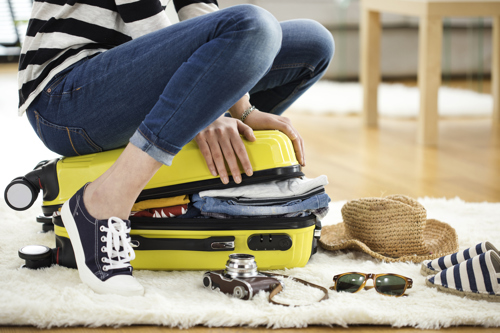How to prepare for a trip abroad

From exploring new parts of the world you have never seen before to revisiting your favourite overseas relaxation destination, taking a trip abroad can be a really exciting experience. However, no matter whether you’re going for business or pleasure, ensuring you prepare properly for your adventure abroad is essential.
With everything to think about, from making sure your passport is in date and necessary vaccinations have been taken to ensuring airport parking has been booked, passenger locator forms have been completed, and foreign currency has been collected, this can be a stressful process. To help you prepare for your next holiday, we’ve put together this handy guide that will remind you of everything you need to do before catching your flight.
How to get ready for a holiday
While there are certain things you want to do before going on a trip abroad - for example, purchasing some new holiday clothing, picking up the perfect pool-side reading material, and getting a pre-holiday hair cut - other things are essential parts of getting ready for a holiday. So, before you prepare to jet off overseas, give yourself at least two months to tick off the vital actions listed below
1. Check your passport
The fact of the matter is, if your password has expired (or you don’t own a passport at all), you won’t be allowed to travel abroad. Many airlines now require you to check your passport is not only valid but also that, on the day you travel, you have at least six months left before it is due to expire.
As a rule of thumb, it takes around six weeks to renew, replace or change details on your passport, and seven weeks to apply for a first passport. This needs to be taken into account when booking your next foreign holiday.
2. Prepare paperwork/digital confirmations
From boarding passes, entry visas and vaccination passports to accommodation and rental car bookings, making sure you have print-outs of all confirmations you need for your holiday (or digital confirmations safely stored in a digital wallet app on a smart device) is vital. You should make sure you have everything you need the day before you travel, giving you time to find/reprint any missing documents before you are due to set off.
3. Organise medications
Some countries may require you to have specific jabs and immunisations before you enter, while, for others, the UK government just recommends you take specific medication prior to travel. For example, it is recommended that before travelling to Mexico from the UK, vaccinations against hepatitis A, typhoid, rabies and tetanus are all taken. These vaccinations - which you will need to pay for - can typically be done at your local GP or at a private travel clinic, and will usually need to be done at least eight weeks before travel. Check the NHS to see if you require a certain vaccination to travel to your chosen destination.
It’s also important to make sure you have enough of any prescription medicine you may need to last the duration of your holiday. When travelling with prescription medication, it is advisable to pack a prescription note to prove it’s necessary medicine.
4. Take out travel insurance
The only thing that makes injuring yourself or falling ill worse is when it happens thousands of miles away from home in an unfamiliar country. This is why travel insurance is so important. Whether you’re going on a high-octane skiing holiday or just a relaxing beach vacation, taking out the right insurance and knowing exactly what it covers against is a crucial part of preparing to go away, and can save you a lot of money, time and stress should something bad happen.
5. Take out spending money
Cash machine (ATM) fees can really add up when you’re overseas, and for this reason, going to your local bureau de change to take out a predetermined amount of foreign currency - be that euros, US dollars or yen - is a good idea.
Prior to travelling, it’s also important to tell your credit/debit card provider that you’re going abroad to ensure overseas transactions are not flagged as unusual activity, which can see your accounts frozen. Finally, if you don’t already know if your credit card charges a foreign transaction fee, contact your provider to find out. If it does, it may be worth taking out a no-fees travel credit card.
6. Organise travel to the airport or airport car parking
With all the excitement and above-mentioned preparation that comes with booking a trip abroad, organising the more mundane things like travel to and from the airport of your choice can easily slip your mind. For this reason, organising methods of travel to and from the airport as soon as your flights are booked is a good idea. This may involve booking an airport taxi service, purchasing tickets on public transport, asking friends or family if they will give you a lift, or booking airport car parking for the duration of your trip
Where do I park at the airport?
If you choose to drive your own car to the airport, there are typically a number of options available to you in terms of parking. At Liverpool John Lennon Airport, for example, we offer a range of convenient car parking options. From our Express Drop Off and Fast Track Parking to our Long Stay and Multi-Storey options, each on-site car park is reasonably-priced, located just a short distance away from the main terminal building, and benefits from 24/7 security.
For more information, simply visit the ‘Book Parking’ page of the LJLA website. Here you can choose which car park you would like to use, pay for your booking, and print your confirmation details several months in advance of your trip. This makes this aspect of preparing for a trip abroad as simple as possible.